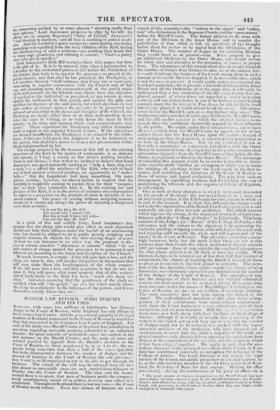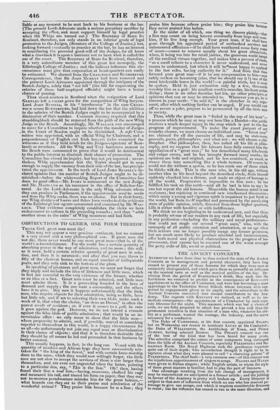SCOTCH LAW BEFORM : WHIG INQUIRY
AND Yrs USES.
SCOTLAND, with some two millions of inhabitants, has thirteen Judges in the Court of Session, while England has only fifteen in her Common Law Courts. And the pooportiona/ quantity of the legal business of Scotland transacted in the Court of Session is much less than that transacted in the Common Law Courts of England. For each of the thirty-two Sheriff Courts of Scotland has jurisdiction in questions regarding moveable property (chattels) to an unlimited amount ; the great majority of mercantile cases are carried, in the first instance, to the Sheriff Courts; and the ratio of cases advocated (carried by appeal) from the Sherirs decision to the Court of' Session, to those acquiesced in, is as 1 to 41 ; the reversals being somewhat less than a halt' of the cases appealed. Nor is the disproportion between the number of .lutlges and the amount of business in the Court of Session the sole grievance : that Court is so ill-organized as not to be able to get through its business. The extent of the evil may be inferred front the fact that almost no mercantile cases are now carried from Glasgow or Dundee into the Court of Session. The time and the money wasted there is so great, that men of business prefer the comparatively unsatisthetory award of an arbiter, in every case where it is conyetent. Throughout Scotland there is but one voice—the Court ot Session needs reform. Even two classes of lawyers are con vinced of this necessity—the " writers to the signet " and "solicitors" who do business in the Supreme Courts, and the " procurators" before the Sheriff Courts. The former propose to do away with one of the Divisions in the Inner House, and to restrict the jurisdiction of that which is left, to questions of law brought before them for review or by appeal from the Ordinaries of the Outer House. The number of Judges in the surviving Division they would leave as at present—four. Some propose to give an additional Ordinary to the Outer House, who should devote Ills whole thne and attention to the preparing of causes in proper form. The advantages of this arrangement are—it would diminish the number ofJudges from thirteen to nine, or, at the utmost, ten : it would distribute the business of the Court among them in such a manner as to enable them to despatch it in reasonable time, which is not the case at present : it would enable suitors to command the best legal assistance ; for at present, when both divisions of the Inner House and all the Ordinaries sit at the same time, it will easily be understood that a bar consisting of (in all) tense twenty-five employed counsel, of whom three are regarded as senior or leading counsel, and one (when better is not to be had) as a quasi leading counsel, must, like the lawyer in Tons Jones, be able to divide itself into twenty pieces if it would attend to all its cases. The procurators before the Sheriff Courts go a step further: they say—" The small comparative number of cases appealed from the Sheriff Courts, and the still smaller number in which the original decision is reversed, show the confidence deservedly reposed in those tribunals by the public. We might, under these circumstances, ask to have all cases carried from the Sheriff Courts by appeal. or for review carried direct into the Inner House upon the merits ; instead of undergoing, as they do at present, a supererogatory preparation as to form in the Outer House. llut we are contented to ask at first only a cumulative or concurrent jurisdiction with the Outer House in matters of form : leaving it free to the parties to carry their advocations (appeals) from the Sheriff Courts either before the Ordinary, as at present, or direct to the Inner House." The advantage of conceding this request would he to render it possible to determine experinientally whether an arrangement might not be made for bringing all questions before the local courts in the first instance, and restricting the functions of the Court of Session to those of review and appeal exclusively. The gain from such an arrangement, by expediting business and diminishing the cost of maintaining the tribunals and the expense and delay of litigation, is self-evident.
One or both of' these alterations is what is at present demanded by the people of Scotland : the provincial lawyers to a man, and an important portion of the Edinburgh lawyers, concur in whole or in part in the demand. It is clear, that although the change would not make the organization of the Scotch Law Courts perfect, it would materially advance them towards perfection. The selfish interest which opposes the change, is the organized monopoly of legal practitioners called the "College of Justice" in Edinburgh. This body consists of the Judges, (or "Senate" of the College of Justice.) the advocates, and the writers to the signet—a body possessing the exclusive privilege of signing certain writs which pass the royal seal, and enjoying until recently the whole and still a great part of the agency in the Court of Session. The advocates consthute a seemingly numerous body, but the truth is that there ;Ire not at this moment more than twenty-five whose professional income exceeds 300/. per annum : these we may consider the employed advocates— the class whose opinion is at all likely to have any weight. With thirteen Judges to be selected out of less than halt' that number of competitors, the chance of reaching the Bench is to each of these so great as to amount in his view al:nost to certainty. Time members of the bar, therefore. whose opinion stands aoy chance of being listened to, are vehemently opposed to any diminution in the number of the Judges of the Court of Session. The unemployed may ape the language of their betters : and not without substantial reasons. for there remain to be scattered amon them some forty snug sinecures under the names of Sheriffshipso Clerkships to the Court of Session, &c. Sc.. to say nothing of numerous pickings. The same unanimity does not exist among the writers to the signet. The well-employed members of this class derive a large portion of their emoluments from extrasimilsial employment : with them the Court business is a very suhordinat part of their occupation, and far from lucrative. Still the C1,7T$ makes them move as a hotly along with their brethren of the College of Justice : although it is worthv of remark. that a mccting of the writers to the signet, got up not long ago to vote that the number of Judges ought not to be reduced, was packed w ith the superannuated memboss of' the profisssion. who have dropped out Of employment, or never had any, while a majority of the really employed members only abstained from opposing the resolutions from disgust at the composition of' the meeting. and the means by which it had been whipped together. M'e ousht to add. that the anomalous character of the principal lins -officer of the Crown in Scotland has contributed materially to strengthen the influence of the College of Justice. The Lord-Advocate is not merely the legal adviser of the Crown and public prosecutor hi criminal matters, he is, as the only surviving member of the old Privy Counail of Scotland, the Secretary of State for that country. Holding his office precariously—during the continuance of his party in office—he is • The soat amount a busies:: despatched in the Sheri q. Court has been stated above. hut that amountis ilime by the Sheritl-Substit ute ; the SheriffsDepute. here Minded to. being. s% ith one eweet out, ,eatit'inui msident in Edinburgh. mst practising in the Court of Session, when they can obtain credit enough to be intrusted midi causes. liable at any moment to be sent back to his business at the bar. (The present Lord-Advocate made a serious pecuniary sacrifice by accepting the office, and must support himself by legal practice when the Whigs arc turned out.) The Secretary of State for Scotland, theretbre, not only stands in an inferior grade of legal promotion to the Judges, (Senators of the College of Justice) but, looking forward eventually to practice at the bar, he has an interest in conciliating the personal .good-will of the Judges, for all know what a drawback it is upon a barrister not to have what is called the ear of the court. The Secretary of State for Scutland, therefore, is a very subordinate member of this great law monopoly, the Edinburgh College ofJustice ; and the indirect influence this circumstance must give that corporation at head-quarters can easily be estimated. We showed from the CRANSTOUN and RUTHERFURD Correspondence, that Sir JOHN MURRAY had been removed and the present Lord-Advocate appointed through the intrigues of the Scotch Judges, solely that "our bill" (the bill for augmenting the salaries of these half-employed officials) might have a better chance of passing. Thus stood matters in Scotland when the resignation of Lord GLRNLEE left a vacant gown for the competition of Whig lawyers. Lord JOHN RUSSELL, in his " interlocutor" in the case CRANSTOUN versus RuTnearinaD, had laid down the law that the addition to the salaries of the Scotch Judges ought to be accompanied by a diminution of their number. Common decency required that this stumblingblock should be removed from the path of the new Whig Judge to the Bench. Accordingly, Mr. WALLACE was encouraged to move for a Committee to inquire whether the number of Judges , in the Court of Session ought to be diminished. A safe Committee was appointed, with an official Whig for Chairman, and a preponderance of English and Irish lawyers (who examined the witnesses as if they held briefs for the Judges-expectant of Scotland) as members. All the Whig and Tory barristers nearest to the Bench were summoned to prove that it would be detrimental to the public interest to diminish their chance of promotion. The Committee has closed its inquiry, but has not yet reported : nevertheless, Whig apprehension lest the Tories should get in soon . enough to supply the vacancy from their side of the bar, has precipitated the appointment. In the teeth of Lord JOHN RUSSELL'S declared opinion that the number of Scotch Judges ought to be diminished—before the whitewashing Report of the Committee has done its good office—Mr. biota is announced as the new Judge, and Mr. MAITLAND as his successor in the office of Solicitor-General. As the Lord-Advocate is the only Whig advocate whom they can produce in Parliament, if the appointments must be made and from the Whig ranks, there was no choice. But in their hurry, our Whig dividers of loaves and fishes have overlooked the evidence of the Edinburgh law-agents summoned and examined by Mr.WALLACE. That evidence completely establishes the views we have endeavoured to enforce in the preceding remarks ; and thus "acids another stone to the cairn" 'of Whig meanness and bad faith.



























 Previous page
Previous page